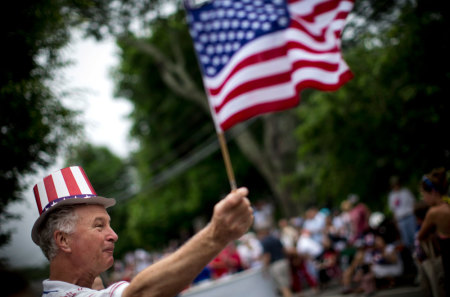4 Myths About the Fourth of July

Across the United States, Americans of all races, colors, politics, and creeds will be celebrating Independence Day.
Parades, BBQs, and parties abound from coastal metropolises littered with skyscrapers to humble Midwest towns where the number of street lights can be counted on one hand.
Amidst the history and the celebration, the observance and the fireworks, several popular myths exist for Fourth of July.
Below, in no particular order, are four myths surrounding Independence Day, the first of which being the actual day it is celebrated on.
I. The Fourth of July was When Independence was Declared
Possibly the most pervasive and officially ingrained myth about Independence Day is the date attributed to the historic event.
In actuality, it was two days earlier on July 2, 1776, that the Continental Congress declared independence from the British Empire.
As John Adams wrote, "the Second of July, 1776, will be the most memorable Epocha, in the History of America. I am apt to believe it will be celebrated, by succeeding Generations, as the great anniversary Festival."
While Adams did go on to become President of the United States and had his share of accomplishments, prophecy was clearly not one of them.
It is believed that the Fourth got all the honors that the Second deserved, and was due to the process of adoption, according to Valerie Strauss of The Answer Sheet Blog.
"The document justifying the act of Congress – you know it as Thomas Jefferson's Declaration of Independence – was adopted on the Fourth, as is indicated on the document itself, which is, one supposes, the cause for all the confusion," wrote Strauss.
"As one scholar has observed, what has happened is that the document announcing the event has overshadowed the event itself."
II. King George III wrote on July 4 That 'Nothing … Happened Today'
Meant for ironic amusement, it has long been claimed online and offline that on July 4, 1776, King George III wrote in his diary "nothing of importance happened today."
Arnold Hunt, curator of historical manuscripts at the British Library, told National Public Radio that the quip was never written by the British monarch who fought against the American Founding Fathers.
"King George III never kept a diary. … The quote is a variation of another well-known story from the French Revolution," said Hunt to NPR back in 2007.
Regarding the French Revolution story, it was said that on the day the French Revolution King Louis XVI wrote in a diary the phrase "nothing," regarding a hunt where no game was killed.
Nevertheless, the false quote continues to be cited in books and blogs alike as an example of downplaying significant events.
III. Declaration of Independence was Signed on July 4
Thanks to a mixture of famous artwork and popular misconception, it is widely believed that the Declaration of Independence was signed on the Fourth of July.
The image of John Trumball's famous painting, itself laden with historical inaccuracies, with its key founding fathers presenting the document before the Continental Congress comes to mind.
However the delegates for the Continental Congress did not as a group sign the document on July 4, which was the date it was officially adopted.
"Nearly a month would go by, however, before the actual signing of the document took place," noted history.com.
"Most of the delegates signed on August 2, but several — Elbridge Gerry, Oliver Wolcott, Lewis Morris, Thomas McKean and Matthew Thornton — signed on a later date. (Two others, John Dickinson and Robert R. Livingston, never signed at all.)"
IV. The Declaration of Independence was the Last Word on the Debate
Adopted on the Fourth, within a year copies of the Declaration of Independence spread throughout the world and were translated into several languages.
In popular historical memory, it is believed that the Declaration was a sort of last word on the debate, with Great Britain responding to the document solely with military force.
However historian David Armitage noted in his 2007 book The Declaration of Independence: A Global History that rebuttals were written in response.
One response, titled Answer to the Declaration of the American Congress and authored by a lawyer named John Lind, had 500 copies sent to the American colonies by the British government.
"The Answer to the Declaration was mostly a point-by-point examination and refutation of the charges against the king," wrote Armitage on page 76.
"Lind [also] mocked the colonists for their hypocrisy in announcing the natural equality of all mankind while failing to free their slaves …"
Former Massachusetts Governor and Boston native Thomas Hutchinson also penned a response, saying the Declaration held "absurd notions of government."
"The Colonies, politically considered, never were a distinct people from the kingdom," argued Hutchinson. "There never has been but one political band, and that was just the same before the first colonists emigrated as it has been ever since …"
Despite these words, American colonists eventually won their struggle for independence and the celebration of that victory continues to the present day.





















